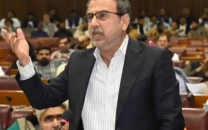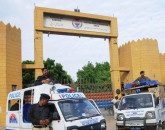Roofs over heads: EWG yet to finalise low income housing plan
Has to come up with policy for rehabilitation, resettlement

The Punjab government launched the Ashiana housing project for low income homeless people in January and set up the PLDC to implement it. The plan was to offer subsidised housing to individuals with monthly incomes of less than Rs20,000.
The group itself was formed on SC orders and told to prepare a roadmap with concrete suggestions in two months.
The EWG was told to form a national policy to address the issue of rehabilitation and resettlement of the inhabitants of slums. It was also ordered to identify anomalies, deficiencies, and suggest legislative measures so that all people are treated equally and in accordance with the law.
The SC, in its order dated February 11, 2016, directed federal and provincial governments to prepare a draft bill to provide inexpensive housing for such individuals.
The decision was made on a petition filed by Asim Sajjad Akhtar against the Federation of Pakistan. The court said that the recommendations should be tabled before the parliament and provincial assemblies by
April 11, 2016.
However, the Capital Development Authority (CDA) recently presented a draft bill in the Supreme Court after a delay of seven months.
In compliance with SC orders, a 17-member EWG was formed and it comprised over secretaries and director generals (DGs) of slum areas across the country.
Serving and former senior officials of the Peshawar Development Authority (PDA), Peshawar Local Government and Rural Development Department, Capital Development Authority (CDA), Housing Advisory Board, National Highways Authority (NHA), Ministry of Housing and Works, Pakistan Engineering Council (PEC), ABAD, Prime Institute of Policy and Research Islamabad and Asian Disaster Preparedness Centre were named as members.
The Supreme Court observed that slums and densely populated illegal settlements needed to be regularised through modern techniques of town planning and building by-laws.
The apex court further noted that there was no policy or legislation to rehabilitate slums, internally displaced people or those affected by famine and natural calamities.
It ordered the federal government to use modern technology or other sources to determine the facts and devise a comprehensive policy for rehabilitation and resettlement of slum dwellers in Pakistan.
The court said there was no data with the Islamabad Capital Territory (ICT) and provinces on displaced people or intercity and rural/urban migration.
It said that the same should be permanently maintained by providing affordable housing scheme on short, medium and long-term bases for people living in abject poverty. The subject of urbanisation and human settlements was transferred from the Ministry of Housing and Works to the Ministry of Climate Change.
Prior to that, such matters were dealt with by the then ministry of environment which prepared the National Housing
Policy 2001.
MoCC sources told The Express Tribune that EWG would seek at least eight months from the apex court to revise the National Policy on Slums, Urban Renewal and Slum Up-gradation 2001 and create a draft bill. Sources privy to the development told The Express Tribune that despite several meetings and the passage of seven months since its formation, the EWG was unable to create a concrete roadmap to provide low-cost housing for slum dwellers and shelter-less people.
Published in The Express Tribune, November 17th, 2016.



















COMMENTS
Comments are moderated and generally will be posted if they are on-topic and not abusive.
For more information, please see our Comments FAQ